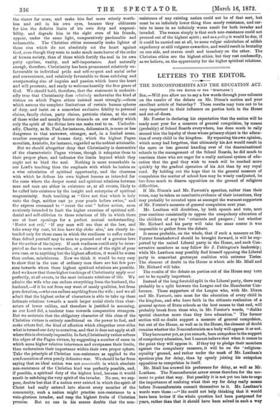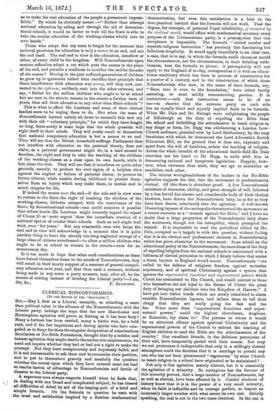LETTERS TO THE EDITOR.
THE NONCONFORMISTS AND THE EDUCATION ACT.
[TO THR EDITOR OF TRH " EPROTATOR."J
SIR,-Will you allow me to say a few words through your columns on the results of the debate on Mr. Dixon's motion and your
excellent article of Saturday? Those results may turn out to be very important in their influence on parties both in the House and out-of-doors.
Mr. Forster in declaring his expectation that the nation will be ready next year for a measure of general compulsion, by means (probably) of School Boards everywhere, has done much to rally around him the loyalty of those whose primary object is the educa- tion of every child in the kingdom. By repeating his own opinion, which many had forgotten, that ultimately his Act would result in the more or less general handing over of the denominational schools to the management of the School Boards, he did much to convince those who are eager for a really national system of edu- cation that the goal they wish to reach will be reached more quickly by the gradual operation of his Act than by any royal road. By holding out the hope that in the general measure of compulsion the matter of school fees may be wisely readjusted, he has done much to disarm opposition on the ground of religious difficulties.
If Mr. Dixon's and Mr. Fawcett's speeches, rather than their votes, may be taken as conclusive evidence of their intentions, they may probably be counted upon as amongst the warmest supporters of Mr. Forster's measure of general compulsion next year.
Mr. Leatham will doubtless, by both speech and vote, next year continue consistently to oppose the compulsory education of the children of any but criminals and paupers ;' but whether Mr. Richard and his party will take the same course it was impossible to gather from the debate.
It seems probable, on the whole, that if such a measure as Mr. Forster foreshadowed should be brought forward, it will be sup- ported by the united Liberal party in the House, and such Con- servative members as may follow Sir J. Pakington's leadership ; while Mr. Leatham may possibly find himself opposing the Liberal party in somewhat grotesque coalition with extreme Tories. The element of doubt in the House is which side Mr. Miall and Mr. Richard will take.
The results of the debate on parties out of the House may turn out to be equally important.
Instead of the long foretold split in the Liberal party, there may probably be a split between the League and the Manchester Con- ference. Those supporters of the League who, with Mr. Dixon and Mr. Fawcett, care most for the education of every child in the kingdom, and who have faith in the ultimate realization of a general system of State schools as the best means to that end, will probably break from those who, in Mr. Forster's words, "dislike special churches more than they love education." The former section will no doubt support a measure of general compulsion, but out of the House, as well as in the House, the element of doubt remains whether the Nonconformists as a body will oppose it or not.
They have never yet, as you remark, been outspoken in the support of compulsory education, but I cannot believe that when it comes to the point they will oppose it. if they try to pledge their members against the compulsory measure, it will be on the 'religious- equality' ground, and rather under the mask of Mr. Leatham's specious plea for delay, than by openly joining his outspoken opposition to compulsion in itself.
Mr. Miall 11 has avowed his preference for delay, as well as Mr. Leatham. The Nonconformist arrow seems therefore for the mo- ment to point that way. But possibly it is not yet too late to urge the importance of realizing what that cry for delay really means before Nonconformists commit themselves to it. Mr. Leatham's words were these :—" He could not help thinking that it would have been better if the whole question had been postponed for years, rather than that it should have been solved in such a way
as to make the real education of the people a permanent impossi- bility." By which he obviously meant :—" Rather than attempt national education by aiding and through the aid of denomina- tional schools, it would be better to wait till the State is able to take the secular education of the working-classes wholly into its own hands."
Those who adopt this cry seem to forget for the moment that national provision for education is only a means to an end, and not ithe'end itself. The real end in view is the education, somehow or other, of every child in the kingdom. Will Nonconformists upon mature reflection adopt a cry which puts the means in the place of the end, and parades a readiness to sacrifice the end for the sake of the means ? Having in the past suffered generations of children to grow up in ignorance rather than sacrifice their principle that State interference with education was wrong, will they now, con- certed to its rightness, suddenly rush into the other extreme, and day, "Better let the million children who ought to be at school but are now in the streets remain in the streets a further" term of years, than aid their education in any other than State schools" ?
This is what in effect Mr. Leatham and some of their clerical leaders seem to be urging them to do. But when the mass of Nonconformist laymen calmly sit down to reconcile this new cry with their old "voluntary principle," for which they have fought no long, there surely is some hope that the whole question will right itself in their minds. They will surely recall to themselves that national compulsory education is but a means to an end. They will see that the British household-suffrage Parliament does not interfere with education on the paternal theory, does not claim, as a paternal government might do, in a land unused to freedom, the right and duty to take the teaching of the children of the working-classes as a class upon its own hands, while it lets alone the rich. They will see that it interferes on quite other grounds, namely, to protect the civil rights of a helpless class against the neglect or failure of parental duties ; to protect its future citizens, while unable during childhood to protect them- selves from an injury which may make them, in morals and in mind, cripples for life.
If indeed the means were the end—if the sole end in view were to restore to the State the right of teaching the children of the working-classes, hitherto usurped, with the connivance of the State, by denominational schools—one could conceive it possible that others beside Mr. Leatham might honestly regard the repeal of Clause 25 as ' more urgent' than the immediate creation of a 'national system of secular State schools. Such an end might well wait, even ' for years.' But any reasonable man who keeps the real end in view will acknowledge in a moment that it is quite another thing to leave the already too-long neglected wrongs of a large class of citizens unredressed—to allow a million children who ought to be at school to remain in the streets—even for an unnecessary day.
Is it too much to hope that when such considerations as these have forced themselves home to the minds of Nonconformists, they will result in their hearty support of a measure of general compul- sory education next year, and that thus such a measure, without being made in any sense a party measure, may, after all, be the means of uniting instead of dividing the Liberal party?—I am,



































 Previous page
Previous page